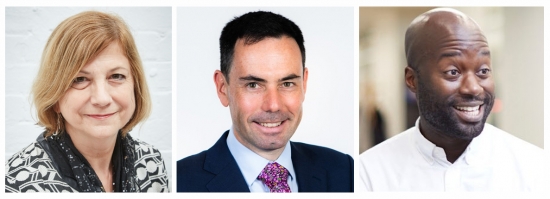News
RSB Policy Lates looks at the positives and negatives for research in ‘the COVID era’
- Details
- 14 August 2020
 The latest Policy Lates panel, from left: Jackie Hunter, Steve Bates and Curtis Asante
The latest Policy Lates panel, from left: Jackie Hunter, Steve Bates and Curtis Asante
Almost 100 people from the UK and beyond joined the RSB’s latest ‘Policy Lates’ event to discuss how discovery research will change in the era of COVID-19.
The second Policy Lates event to be hosted online saw a panel of experts discuss particular strategies and policies driving research on COVID-19 and the lessons that can be taken from this period of intense scientific activity. The panel also spoke candidly of the impact COVID-19 has had and will have on funding, infrastructure, outcomes and careers in research more broadly.
Jackie Hunter CBE FRSB, chief executive of Benevolent AI, chaired the event and described how artificial intelligence (AI) has assisted with predictions of outbreaks, the diagnosis of disease and the identification of potential molecules to treat the disease. She said the development of these functions would be of great importance in science generally and because “this will not be the last time we experience a pandemic”.
“AI and machine learning can respond quickly to large datasets and rapidly changing circumstances,” said Hunter. “This significantly augments the ability of scientists, policymakers and others to interrogate the information they see.”
Steve Bates OBE, chief executive of the BioIndustry Association, said that one of the major aspects of the research system that had been “remodelled” due to COVID-19 was Government, which was “melted down and reorganised several times week by week” at the height of the crisis.
“Suddenly you have new processes and new organisations emerging. NHS Track and Trace, the Lighthouse Labs, the therapeutics and vaccine task forces…None of these entities, which are now making significant decisions around billions of pounds’ worth of UK investment, existed in February.”
Curtis Asante, research programme manager at Cancer Research UK (CRUK), provided an honest appraisal of the effect that the pandemic recession would have on the organisation, one of the largest medical fundraising charities in the world.
The charity faces a 30% reduction in income (£160m) this year and a reduction of up to £300m over the next three years. Asante said the necessary cuts would lead to the loss of up to 500 jobs at CRUK, cuts to their research portfolio, and cuts to their research centres and the UK’s cancer infrastructure.
The panel also discussed the huge potential impacts on PhD students and other time-limited and funding-limited researchers – not only the effect on careers, qualifications and findings, but the danger of a general loss of talent in the UK research pool.
Responding to questions, the panellists were asked to name three positives that had emerged from the COVID-19 crisis. The panel agreed that there were plenty of encouraging lessons and opportunities, including the remarkable speed of discovery achieved over the last six months, the success and scale of data sharing and collaboration, the huge public interest in bioscience, and positive and inclusive changes in working practice.
“There have been so many programmes and documentaries about COVID-19, about virus transmission and biology,” said Asante. “These are terrible times but biology and clinical research has really become quite exciting in the way that space was really exciting a few years ago and still is. I think that's really important in bringing in a new audience and inspiring others, and hopefully that will mean that the future for research and development in this country is strong.”
This year our Policy Lates series is supported by the Biochemical Society, British Pharmacological Society, Society for Applied Microbiology, Society for Experimental Biology, and The Physiological Society.
Videos from this event and the RSB’s previous Policy Lates event on AMR are available on the RSB’s YouTube channel.

